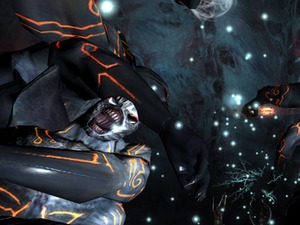Have a Vision
Tabula Rasa took nearly seven years and reportedly cost more than $100 million to develop, yet it was six years into development before anything that the public could actually play was produced. A blog entry by Scott Jennings, an MMO designer working on another project at NCSoft’s Austin, Texas, offices, says it all: "It just wasn’t a game that very many people got passionate about." The game’s biggest failing, Jennings explains, "was that it was in development about twice as long and [cost] twice as much as it had any right to".Why? Arguably, this was due to a lack of coherent vision. Originally devised as a new breed of MMO, taking in the best of Far Eastern and Western MMO traditions, Tabula Rasa was developed by teams working in both Austin and Korea. Unfortunately, several iterations of the design failed to bring the disparate styles together.
Two years after development started, 75 per cent of the code, 25 per cent of the team and all of the game’s art assets were replaced. The exotic sci-fi/fantasy mix of the original version was shelved in favour of the safer, more Halo-esque style of the finished game.


Richard Garriott's considerable RPG expertise didn't help Tabula Rasa (left), while Hellgate: London (right) failed despite being developed by former Blizzard employees
Many people have jumped on the fact that games such as Hellgate: London, Tabula Rasa and NetDevil’s Auto Assault have suffered because they diverged from the standard fantasy MMO world that WoW has defined. Gamers, according to the theory, know where they are with chainmail and broadswords, but they don’t feel that plasma guns and force-fields fit in with RPG gameplay. For NetDevil’s Scott Brown, however, that’s part of the excitement. "Taking games beyond what has already been done is something we set out to do when we started NetDevil . . . . maybe we’re sick in the head, but we love the challenge of doing new games," he says.
For Jeffrey Steefel, executive producer of Turbine’s Lord of the Rings Online, there’s nothing wrong with doing something new, as long as you’re doing it for the right reasons. "If you’re trying to be different for [its own] sake, because you believe that if you just build something that’s fundamentally different from everything else, then that will be successful, then yes, you’re going to have problems," he argues. "But if you identify that the needs of the marketplace have changed, perhaps because the market is bigger, or is just different, and you do something different to address that, then there are all kinds of opportunities."
Erling Elesson of Age of Conan developer, Funcom, agrees. "Everybody wants a new MMO that will feel different and play differently. However, [people] won’t accept innovation just for the sake of innovation. It still needs to play well and it needs to be as much fun as previous-generation games," he says. "That’s the challenge for us as developers – to innovate, but still manage to keep what’s good
about other games."
Elesson and Steefel both worked on MMOs based on established intellectual properties. While the developers working on Tabula Rasa and Hellgate had to create both a game and its world from scratch, Steefel and his team faced a different task: creating a Middle Earth that Tolkien’s readers could explore, enjoy and recognise. "The most important thing for us was to boil down the story and world that Tolkien was writing about to more fundamental [elements]," he says.
These fundamentals drive everything in LOTRO, from the way the world looks to the way that characters behave and how the content unfolds. "Working with an IP like this is really a double-edged sword," continues Steefel. "It certainly makes things harder, as it does for anyone in media who is making something around an existing IP. The ‘Watchmen’ movie is an extreme example of how
it’s really difficult to bring something to fans who have an iron-clad expectation of what it’s going to be. Fortunately, with Tolkien, as it’s a much broader audience – hundreds of millions of people have read the books – there’s a little more play, and the world that Tolkien built is so rich and deep and broad that it has a lot of room in it for things that you don’t know so much about."

MSI MPG Velox 100R Chassis Review
October 14 2021 | 15:04










Want to comment? Please log in.